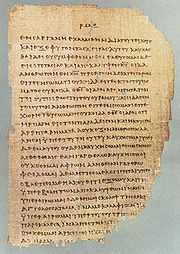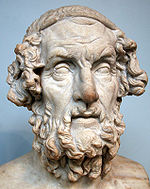- Cretan Greek
-
History of the
Greek language
(see also: Greek alphabet)
Proto-Greek (c. 3000–1600 BC) Mycenaean (c. 1600–1100 BC) Ancient Greek (c. 800–330 BC)
Dialects:
Aeolic, Arcadocypriot, Attic-Ionic,
Doric, Locrian, Pamphylian,
Homeric Greek,
Macedonian (?)Koine Greek (c. 330 BC–330) Medieval Greek (330–1453) Modern Greek (from 1453)
Dialects:
Calabrian, Cappadocian, Cheimarriotika, Cretan,
Cypriot, Demotic, Griko, Katharevousa,
Pontic, Tsakonian, Maniot, Yevanic
*Dates (beginning with Ancient Greek) from Wallace, D. B. (1996). Greek Grammar Beyond the Basics: An Exegetical Syntax of the New Testament. Grand Rapids: Zondervan. p. 12. ISBN 0310218950.Cretan Greek (Cretan dialect — in Greek, Kritikí diálektos – Κρητική διάλεκτος or Kritiká Κρητικά) is a dialect of the Greek language, spoken by more than half a million people in Crete and many thousands in the diaspora.
Contents
Geographic distribution
The Cretan dialect is spoken by the majority of the Cretan Greeks in the island of Crete, as well as by several thousands of Cretans who have settled in major Greek cities, notably in Athens. In the major centers of the Greek diaspora, the dialect continues to be used by the Cretans, mainly in the United States, Australia, and Germany. In addition, the descendants of many Cretan Muslims who left the island during the 19th and early 20th century continue to use it. In Turkey, they are called Cretan Turks. There is another grouping of Cretan Muslims in the coastal town of Al Hamidiyah, Syria, and the neighboring territories of Lebanon.
Phonology
- Palatalisation. Standard Greek has an allophonic alternation between velar consonants ([k], [ɡ], [x], [ɣ]) and palatalised counterparts (([c], [ɟ], [ç], [ʝ]) before front vowels (/i/, /e/). In southern dialects, the palatalisation goes further towards affricates (e.g. [tɕe] vs. standard [ce] 'and'). Subtypes can be distinguished that have either palato-alveolar ([tʃ], [dʒ], [ʃ], [ʒ]) or alveolo-palatal sounds ([tɕ], [dʑ], [ɕ], [ʑ]). The former are reported for Cyprus, the latter for Crete, among others.[1]
Grammar
- inda? versus ti? In Standard Greek, the interrogative pronoun 'what?' is ti. In most of the Aegean Islands (except at its geographical fringe: Rhodes in the south-east, Lemnos, Thasos and the Sporades in the north; and Andros in the west), it is inda[2] as it is for Cyprus.
Usage and settings
Today the Cretan dialect is rarely used in writing. However, Cretan Greeks usually communicate with each other in this dialect. Cretan is not much different from the Greek dialects or Standard Greek, and has a fairly high level of mutual intelligibility. Many organizations of Cretans aim to preserve their culture, including their dialect, and the dialect does not seem to be in danger of extinction. Some academics speculate that Cretan could have become the basis of Modern Standard Greek, given its flourishing history and achievements. According to them, this process was interrupted by the Ottoman conquest in 1669.[citation needed]
History
Like all other modern Greek dialects except Tsakonian and, to some extent, Griko, Cretan evolved from Koine. Its structure and vocabulary have preserved different features than standard Greek, due to the distance of Crete from the main Greek centers.
There are also influences from other languages. The conquest of Crete by the Andalusian Moors in 824 left mainly toponyms. However, Venetian influence proved to be stronger since the island remained under Venetian control for nearly five centuries. To this day, many toponyms, names and words stem from the Venetian language of early modern times, which came to reinforce the Latin influence from antiquity and the early Byzantine Empire. Following the Ottoman conquest of 1669, Turkish words entered the vocabulary of Cretans as well. Borrowings, as usual, are mainly lexical; Arabic, Turkish, and Venetian had little or no effect on grammar and syntax. With the beginning of the 20th century and the evolution of technology and tourism, English, French and German terms are widely used.
Literature
Medieval works suggest that Modern Greek started shaping as early as the 10th century, with one of the first works being the epic poem of Digenis Acritas). However, the first literary activity which was important enough to be identified as "modern Greek literature" was done in the Cretan dialect during the 16th century.
Erotokritos is undoubtedly the masterpiece of the Cretan literature, and perhaps the supreme achievement of modern Greek literature. It is a romantic work written around 1600 by Vitsentzos Kornaros (1553-1613). In over 10,000 lines of rhyming fifteen-syllable couplets, the poet relates the trials and tribulations suffered by two young lovers, Erotokritos and Aretousa, daughter of Heracles, King of Athens. It was a tale that enjoyed enormous popularity among its Greek readership.
The poets of the period of Cretan literature (15th-17th centuries) used the spoken Cretan dialect. The tendency to purge the language of foreign elements was above all represented by Chortatsis, Kornaros and the anonymous poets of Voskopoula and the Sacrifice of Abraham, whose works highlight the expressive power of the dialect. As dictated by the pseudo-Aristotelian theory of decorum, the heroes of the works use a vocabulary analogous to their social and educational background. It was thanks to this convention that the Cretan comedies were written in a language that was an amalgam of Italicisms, Latinisms and the local dialect, thereby approximating to the actual language of the middle class of the Cretan towns. The time span separating Antonios Achelis, author of the Siege of Malta (1570), and Chortatsis and Kornaros is too short to allow for the formation, from scratch, of the Cretan dialect we see in the texts of the latter two. The only explanation, therefore, is that the poets at the end of the sixteenth century were consciously employing a particular linguistic preference – they were aiming at a pure style of language for their literature and, via that language, a separate identity for the Greek literary production of their homeland.
The flourishing Cretan school was all but terminated by the Turkish capture of the island in the 17th century. The ballads of the klephts, however, survive from the 18th century; these are the songs of the Greek mountain fighters who carried on guerrilla warfare against the Turks.
Many Greek authors have integrated Cretan literary elements in their respective works. Among these authors were Nikos Kazantzakis who was known for his literary contributions mainly written in standard Greek. This paradigm, overall, has helped Kazantzakis to write significant works such as Zorba the Greek and thus establish for himself recognition in various international circles.
References
See also
Greek language · Eλληνική γλώσσα History Proto-Greek (c. 3000–1600 BC) · Mycenaean (c. 1600–1000 BC) · Ancient Greek (c. 1000–330 BC) · Koine Greek (c. 330 BC–330) · Medieval Greek (330–1453) · Modern Greek (from 1453)
Alphabet Letters Phonology Grammar Dialects Cappadocian · Cretan · Cypriot · Chalkidiki · Demotic · Greek-Calabrian · Griko · Katharevousa · Macedonian · Misthiotica · Pontic · Tsakonian · YevanicLiterature Related Topics Promotion and Study Ages of Greek c. 3rd millenium BC c. 1600–1100 BC c. 800–300 BC c. 300 BC – AD 330 c. 330–1453 since 1453 Categories:
Wikimedia Foundation. 2010.
